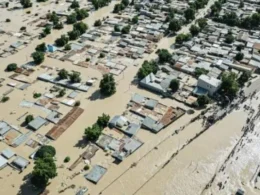Civil Society Organisation KDI Releases Report on #EndBadGovernance Movement Ahead of Protesters’ Trial
Ahead of the January 29, 2025, trial of #EndBadGovernance protesters at the Federal High Court in Abuja, the Civil Society Organisation (CSO), Kimpact Development Initiative (KDI), has unveiled an assessment report titled Beyond the Protest.
The report presentation, held in Abuja, was attended by representatives from the Nigerian Police Force (NPF), the National Human Rights Commission (NHRC), other Civil Society Organizations, development partners, and members of the media.
In his opening remarks, KDI’s Executive Director, Bukola Idowu, emphasized the significance of the report, describing it as a pivotal moment in Nigeria’s socio-political evolution. He highlighted that protests like #EndBadGovernance and #EndSARS have demonstrated the transformative power of civic action in influencing governance and societal change.
“The #EndBadGovernance protest, like others before it, reveals the strength of civic engagement in shaping Nigeria’s future,” Idowu stated. He called for security agencies to adopt less confrontational approaches to protests, fostering trust and constructive dialogue between citizens and the government.
Idowu added, “Our study examines the complexities and implications of protests in Nigeria, addressing critical dimensions such as regional responses, governance impacts, human rights, the rule of law, and the role of social media in amplifying civic action. These movements underscore that protests are not merely expressions of dissent but powerful catalysts for social change.”
He further expressed that the findings from the report are not only research insights but also a “clarion call to action,” meant to guide policy decisions, advocacy efforts, and inspire citizens to actively promote good governance, human rights, and social justice.
The KDI report includes key recommendations:
- Moving protests beyond the streets to formalized citizen engagement and post-protest dialogues.
- Promoting non-coercive responses by security agencies.
- Empowering youth to play a central role in governance.
- Encouraging the government to reframe its approach to protests as opportunities for dialogue rather than threats.
“Protests should not always end on the streets,” Idowu noted. “The real work begins after. It is crucial to transition protests into boardroom discussions where policy decisions are made. That is where sustainable change happens.”
During a panel discussion, the Deputy Force Public Relations Officer of the Nigeria Police Force, CSP Isuku Victor Edailokun, defended the controversial arrest, detention, and arraignment of child protesters.
The report has been hailed as a roadmap for bridging the gap between civic action and policy reform, with hopes that it will inspire a more collaborative and constructive approach to governance and civic engagement.









